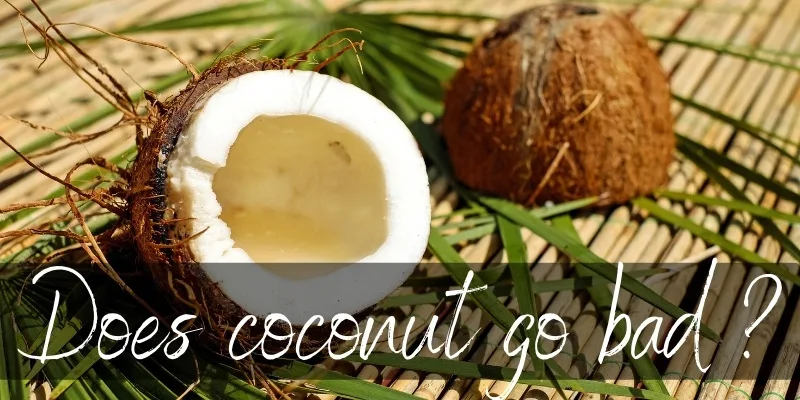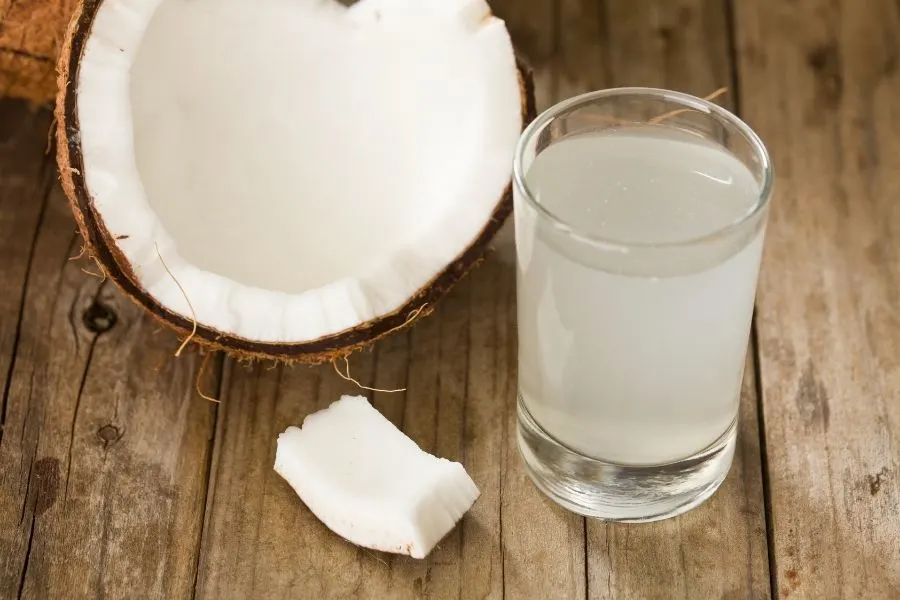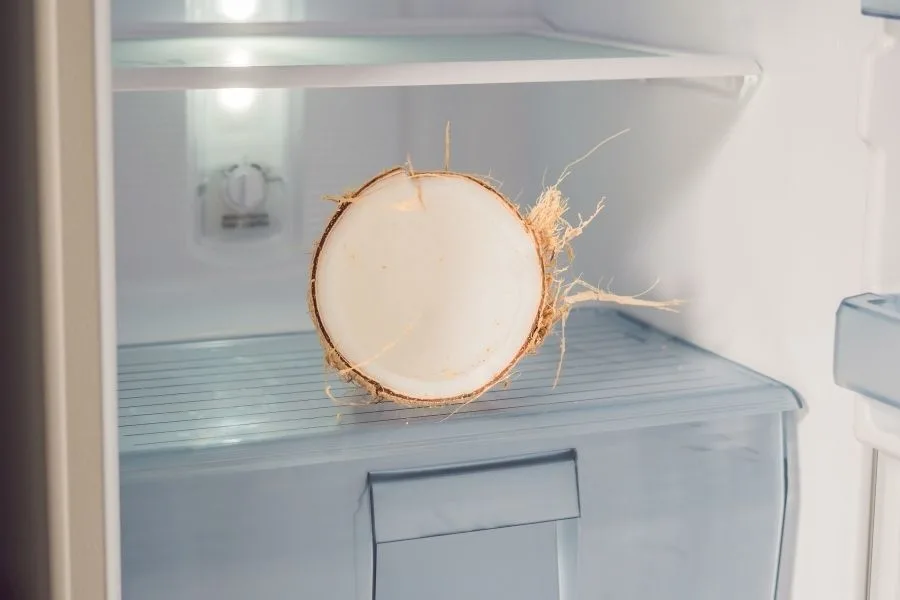Coconuts are surely one of the most amazing tropical wonders packing up health and flavor at the same time. That hard exterior has a refreshing punch inside. There’s also chewy meat that can be eaten raw or added into a whole bunch of treats – shredded, chopped, or powdered.
But just like most other fruits and nuts, even a coconut is likely to turn old and inedible over time. Some who like to store many coconuts at home may ask – does coconut go bad? Here’s the answer you’re looking for.

Does coconut go bad?
Yes, coconuts can go bad if the shells are cracked and bacteria get inside. All the moisture or mold usually builds up around or through the eyes. There are times when you can hear a lot of water inside the nut, yet it could have turned bad if there was water around the eyes.
Other than that the only bad coconuts are very old coconuts, those that are over a year old. While very old coconuts won’t necessarily go bad, they will change their flavor and will become stale. Once you open old coconuts they rot much faster.
Read also: Can You Freeze Coconut Milk ?
How long does a coconut last?
Once you have a nice and fresh coconut, it will typically remain fresh at room temperature for nearly 4 months if kept in a dry and cool spot. If you have opened the coconut, it’s going to last in the fridge for a week. It can last 6-8 months in the freezer.
The shelf life of coconuts largely varies with the way you store them. Keep in mind that frozen whole coconuts may crack open.
What about shredded coconut?
Shredded coconut also changes its shelf life. If you leave it at room temperatures, it can remain edible up to 4-6 months without turning rancid. If you put it in the fridge or a freezer, the shredded coconut will last for 8-10 months, that too with zero signs of spoilage.
How to determine if a coconut is bad
It’s best to check any coconut for damage before you buy it. This way you’ll make sure you don’t waste good money on a spoiled coconut.
Check the exterior
The first step is to inspect the exterior of the coconut. The sweet water inside the nut tends to evaporate over time, so fresh coconuts are usually heavy and are likely to slosh when you shake them.
The eyes at the tip of a fresh coconut match the husk’s color, but shrink and darken on old nuts.
A sure sign of a spoiled coconut is visible mold, or liquid leaking from the eyes. Sometimes, you can’t be sure of the coconut’s quality until you inspect the elements inside.
Check the water
Puncture two of the coconut’s eyes using a large nail or a screwdriver disinfected using some alcohol. While you drain the nut’s water, the first test of its freshness is to check the smell.
A fresh coconut will ooze a clean fragrance with a sweet touch, while a spoiled coconut exhibits a musty smell. Use one of the holes to pour out the water, while the second one functions as an air hole.
If the water tastes sweet and plentiful in quantity, you have a fresh and healthy coconut. Discard the coconut right away if you notice the liquid smelling like alcohol.

Check the flesh
Bitter water means that the coconut flesh is also going to taste bland. To check this get a spoon and scrape off a few pieces of coconut meat.
You can also fully open the nut to check the meat for discoloring. Pure white flesh tastes perfect, but if you find the meat turning yellow or developing mold, discard the coconut.
Bad coconuts are quite pungent when you crack them open, and can even make one retch.
How to store fresh coconut
If you don’t store coconuts properly, they will likely turn rancid super quickly due to the high oil contents. Although, it’s best to use coconut while it’s absolutely fresh, you can always preserve it with a little care.
The whole idea behind storing coconuts the right way is to make sure there is no moisture. You can even keep a fresh, unopened whole coconut at room temp for months on end, if the air is dry.
Dried coconut can be stored at room temperature for quite a long time, as it’s already in a dehydrated form. Unless it starts to smell bad, it’s still good.
Before you head towards storing the coconuts, it’s best to remove as much of the meat as possible. You can do this using a spoon or a specially-crafted coconut tool that makes it easier.
Once all the edible stuff is separated from the husk, you can choose between freezing and refrigerating the coconut. It depends on how long you want to store it.
Make sure you have an airtight container
Whether you go for refrigeration or freezing, it’s essential to store coconut in an airtight container, with as much air removed as possible. A vacuum container gets the most life out of the coconut and keeps its natural flavor.
It’d be even better if you could use a vacuum sealer to do the job, if you have one at home.
Another method is to go for a Ziploc bag, placed inside a large bowl of water to force out all the air. Once you have sealed the coconut inside a Ziploc pouch, you can either place it in the refrigerator or the freezer.
Keep coconut in the fridge
You can refrigerate a coconut in the form of small chunks or shredded bits. Most people prefer going for shredded coconut, further squeezing out the maximum moisture from it.
Keep in mind that you can separate the water from the coconut meat, and keep both in the fridge. You will have to use airtight containers for both.
Fresh coconut meat ca last 3-4 days in the fridge, while coconut water can last 2-3 days before turning funky.

Read Also:Does Balsamic Vinegar Go Bad ?
Freezing
If you want to store the coconut for the long term choose to freeze it. This way you can keep coconut meat for up to 8 months.
Grate the coconut pieces, squeeze out the liquid, and put them in an airtight container. Make sure you’ve got as much air removed as possible and that the lid is sealed before you put it in the freezer.
The coconut may expand a little when kept in the freezer, so make sure you leave a little room in the container before putting it inside.
To summarize, if you see that a coconut has developed visible cracks in its shell, or notice signs or mold or water leakage, the nut has gone bad.
You either need to buy another nut or simply discard it if you’ve already bought one and it grew old and inedible. A piece of quick advice would be to purchase fresh coconuts only when needed, and freeze some for later. This way you can have fresh coconut water or meat without going out to buy another nut.
Conclusion
We found out how long fresh and shredded coconut last depending on the way you store them. I hope this article helped you know what to do with the coconut you have and how to store it properly.

